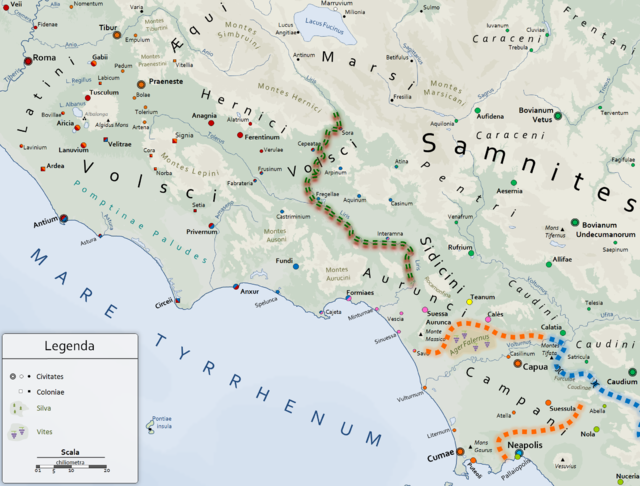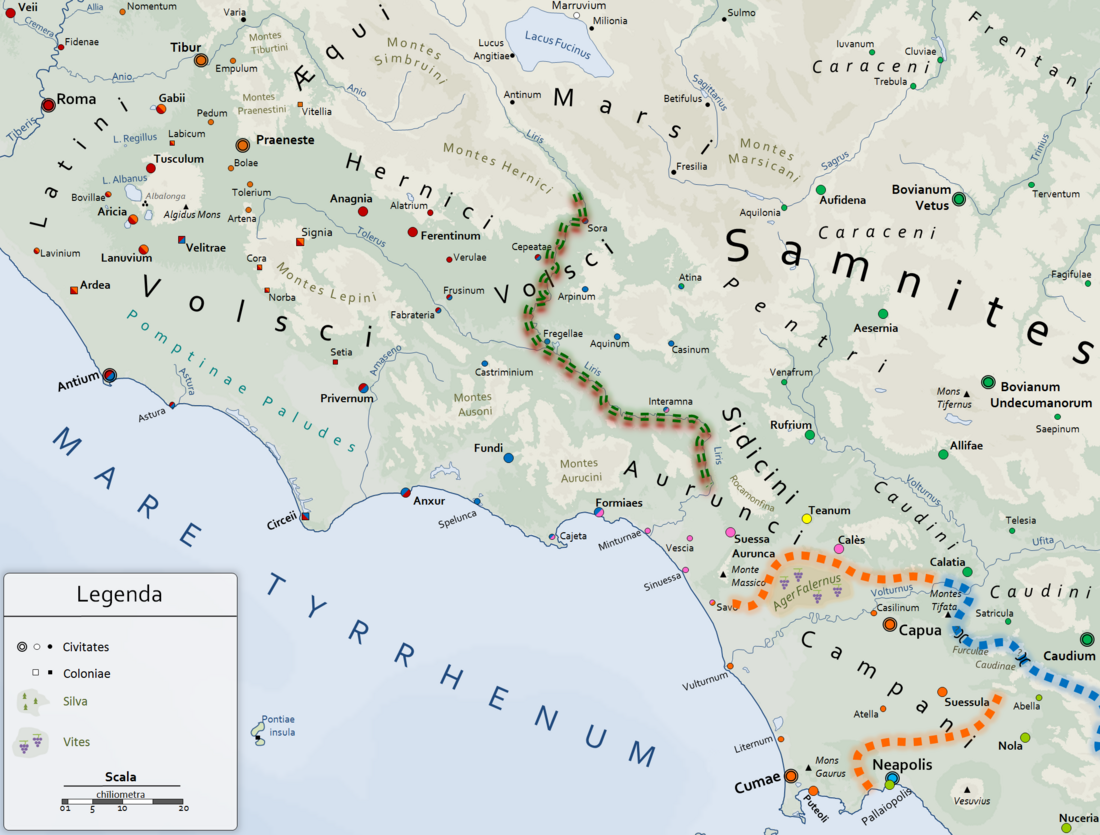Aurunci
Italic tribe of ancient Italy From Wikipedia, the free encyclopedia
The Aurunci were an ancient Italic tribe that inhabited the region around Monte Santa Croce and Sessa Aurunca in southern Latium and northern Campania.

Roman authors often equated the Aurunci with the broader group known as the Ausones (Αὔσονες), a term used by the Greeks to describe various Italic peoples. However, by the 4th century BCE, Roman sources distinguished the two groups as separate yet related tribes, both dwelling on the borders of Latium and Campania.
The Aurunci were considered one of the most ancient and powerful nations of Italy in early historical records. They were involved in numerous conflicts with Rome, notably in the 5th and 4th centuries BCE, including their participation in the Latin War (340–338 BCE). Over time, their territory was gradually incorporated into the Roman Republic, and their independent existence came to an end. The modern town of Sessa Aurunca and the Aurunci Mountains preserve the name of this ancient tribe.
Name and identity
Summarize
Perspective
The name "Aurunci" (singular: Auruncus) is well attested in Roman literary and grammatical sources, while Greek authors used the ethnonym "Ausones" (Αὔσονες) to refer more generally to a variety of Italic peoples inhabiting southern Latium and Campania. Although early writers appear to use the two terms interchangeably, later Roman sources distinguish between the Aurunci and Ausones as separate but related tribes.
According to ancient grammarians such as Marcus Terentius Varro, the Latin name "Aurunci" may have derived from "Ausones" through the phonological process of rhotacism, by which an intervocalic s becomes r. Thus, the form "Ausoni" would have yielded "Auruni" or "Aurunci" in Latin.[1] Modern scholars affirm this linguistic interpretation, noting that the two names reflect a common origin: “i due nomi si risolvono nell’unico ‘Ausoni’, dove per il fenomeno del rotacismo la ‘s’ intervocalica passa in ‘r’, di qui ‘Auronici’ e Aurunci.”[2]
Servius described the Aurunci as one of the most ancient nations of Italy. Other late antique sources, including Cassius Dio and Festus, also classified the Aurunci among the Ausonian peoples, a broad cultural-linguistic group said to have occupied a wide region from the Volsci in the north to the Campanians in the south.[3]
By the 4th century BCE, however, Roman historical narratives increasingly treated the Aurunci and Ausones as distinct communities. The Aurunci were identified with the volcanic highlands of Monte Santa Croce (modern Roccamonfina) and the surrounding lowlands, while the Ausones were located further south near the Liri and Garigliano river valleys. Despite these distinctions, the two groups likely shared linguistic and cultural features characteristic of Oscan-speaking Italic peoples.
Territory and settlements
Summarize
Perspective
In early historical traditions, the Aurunci occupied a broad swath of southern Latium and northern Campania, a transitional zone between the Latin and Oscan cultural spheres. By the late 4th century BCE, however, their presence had contracted to the upland region surrounding Monte Santa Croce (modern Roccamonfina), a dormant volcanic massif. This area became their final stronghold before Roman colonization.
According to Roman sources, the Aurunci originally inhabited the fortified hilltop city of Aurunca, located near the summit of Monte Santa Croce. Following pressure from the neighboring Sidicini, the Aurunci abandoned Aurunca in 337 BCE and relocated to Suessa (modern Sessa Aurunca) on the mountain's southwestern slope.[4] Suessa became the political and economic center of Auruncan territory in its final phase, and in 313 BCE it was transformed into a Roman colony.[5]
Ancient literary and modern archaeological evidence suggest that the Aurunci formed part of a broader Oscan-speaking confederation known as the Pentapoli Aurunca, which included the cities of Aurunca, Suessa, Ausona, Minturnae, and Vescia.[6][7] These communities, though politically autonomous, appear to have shared religious traditions, linguistic affinities, and defensive strategies, reflecting a regional identity distinct from both the Latins and Campanians. Livy records the destruction of several of these cities—including Ausona, Minturnae, and Vescia—by the Romans in 314 BCE, during punitive campaigns against those who had allied with the Samnites.[8]
Material evidence from sites associated with the Aurunci supports this historical framework. Fortification remains, including polygonal masonry walls, have been identified on and around Monte Santa Croce and at locations linked to the pentapolis. These defensive structures suggest a network of hillfort settlements, characteristic of Oscan-speaking peoples in the mid-Republican period.[9]
Further south, along the Garigliano River, sites like Mortola attest to long-term habitation and economic activity in the Auruncan hinterland. Excavations there have uncovered amphora kilns, tabernae, and evidence of late Republican trade networks. Though Roman in date, the site's location suggests continuity of occupation and integration into regional exchange systems rooted in pre-Roman infrastructure.[10]
Historical references
Summarize
Perspective
The Aurunci appear early in Roman historiography as one of several Italic peoples resisting Latin and Roman expansion. Their conflicts with Rome span more than a century, punctuated by long silences in the literary record and ultimately culminating in conquest and colonization.
The first recorded conflict occurred in 503–502 BCE, when the Latin towns of Cora and Pometia revolted against Rome with support from the Aurunci. According to Livy, the Roman consuls led a successful campaign against the rebels, defeating the Aurunci and restoring Roman influence in the region.[11]
A renewed confrontation followed in 495 BCE, during a broader period of unrest involving the Volsci. The Aurunci advanced as far as Ariccia, but were decisively defeated by the consul Publius Servilius Priscus Structus.[12] After this defeat, the Aurunci disappear from Roman narratives for nearly a century, suggesting either a decline in political autonomy or a shift in focus to other regional powers such as the Volsci, Aequi, and Samnites.
The Aurunci re-emerge in 344 BCE, described by Livy as a “people of the mountains” (gens montana) inhabiting the rugged volcanic uplands near Monte Santa Croce.[13] This shift in description reflects a broader pattern of contraction and marginalization, possibly caused by pressure from the Sidicini and encroachment by Rome and its allies. The Aurunci were again defeated and forced to submit to Roman authority.
In 337 BCE, facing renewed conflict with neighboring groups, the Aurunci abandoned their ancient capital of Aurunca and resettled at Suessa, a lower and more accessible site on the southwestern slope of Monte Santa Croce. This migration, recorded by Livy, marked a turning point in Auruncan history, signaling both their loss of strategic highland defensibility and their increasing proximity to Roman oversight.[14]
By 314 BCE, during the Second Samnite War, the Aurunci had allied with the Samnites against Rome. As punishment, the Roman army razed several cities associated with the Auruncan pentapolis—including Ausona, Minturnae, and Vescia—and massacred their male populations. This act, described by Livy as an annihilation (in armis caesi sunt, nec ulla Auruncorum viro superest), effectively ended Auruncan independence.[15]
The final step in Roman integration came in 313 BCE, when a Latin colony was formally established at Suessa. This act institutionalized Roman control over former Auruncan territory, incorporated local elites into Roman municipal frameworks, and erased the last vestiges of independent Auruncan political identity.[16]
These literary accounts, though shaped by Roman ideological frameworks, find support in archaeological patterns of destruction and resettlement across sites linked to the Aurunci. The coordinated destruction of hilltop cities and reorganization of settlement in the plains reflect Rome’s broader policy of territorial consolidation in the late 4th century BCE.
Cultural and Linguistic Context
The Aurunci are generally believed to have spoken an Oscan dialect, placing them within the broader Osco-Umbrian language group common to many Italic peoples. Their customs, material culture, and urban forms likely resembled those of neighboring Oscan-speaking groups, including the Sidicini, Volsci, and Campanians.[17] It is likely that due to the amount that the suffix co was used in the region, that they spoke Volscian.[18]
Like the Ausones, the Aurunci were associated with early hillfort settlements, some of which have been identified through remains of polygonal walls near Roccamonfina and other nearby sites.[19]
Legacy
The name of the Aurunci survives today in the Monti Aurunci, a mountain range in southern Lazio, and in the modern town of Sessa Aurunca, which preserves the name of the tribe’s final capital. In Roman literature, the Aurunci are occasionally referenced by poets, but more often the poetic term "Ausonia" supplanted their specific name.
See also
References
Further reading
Attribution
Wikiwand - on
Seamless Wikipedia browsing. On steroids.
